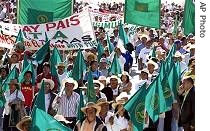2007年VOA标准英语-Rising Oil Prices Fuel Corn Tortilla Price Hike(在线收听)
Washington
20 March 2007
Rising world oil prices have sparked interest in alternative fuels, such as ethanol, which can be produced from corn. This has raised demand for the grain, which, in turn, has increased its price as food. VOA's Peter Fedynsky reports that higher prices may not be the only cost associated with corn-based ethanol.
 |
| People march in Mexico City to protest recent tortilla price increases, 31 Jan 2007 |
President Calderon says the 13-point agreement is aimed at protecting Mexican families and the economy from further price hikes on corn.
Mexican tortilla prices have skyrocketed more than 700 percent since 1994. Experts say this is due in part to increased demand for corn to produce ethanol.
Speaking at a recent Capitol Hill news conference in Washington Daniel De La Torre Ugarte, from the Agricultural Policy Analysis Center at the University of Tennessee, warned that price hikes are but one effect of rising demand for corn. He says it can have consequences for agriculture as well.
"Not only because it jeopardizes food security in many countries, but because, at the same time, it also creates a new incentive to expand production to areas that may not be suitable for the crop," said Daniel De La Torre Ugarte. "So, we are going to put undue pressure on natural resources to try to respond with a larger production for corn."
Ugarte is not opposed to bio-fuels as such. Nor is Alexandra Spieldoch, from the Institute for Agriculture and Trade Policy in Minneapolis, Minnesota. But Spieldoch warns of the consequences of over-reliance on a single crop.
"Corn mono-cropping is already eroding U.S. farmland," said Alexandra Spieldoch. "It's water intensive. It increases the amounts of herbicides. It's not considered viable in the long term."
Spieldoch adds, corn prices are not driven by ethanol alone. She says the North American Free Trade Agreement, or NAFTA, as well as U.S. farm subsidies have forced Mexico - a traditional corn exporter - to import the commodity from the United States.
Former Mexican congressman Victor Quintana says NAFTA has favored corporate agribusiness at the expense of poor Mexican farmers, who then seek a better living across the border.
Quintana says that, for each 30-ton container of corn exported to Mexico, the United States receives two undocumented migrants from the Mexican countryside.
Philip Levy, a former member of President Bush's Council of Economic Advisers and currently a scholar at the American Enterprise Institute in Washington, acknowledges the displacement of many Mexican farmers. But he says free trade has helped Mexico as a whole.
"When you're talking about what's good or bad for a country in trade, you have to be careful, and we're seeing this in Mexico right now," he said. "If you are a producer of corn, no matter what the cause, high corn prices are welcome. You want it. If you are a consumer of corn, high corn prices are bad. And you don't want it."
Levy says the demand for ethanol could become so high that no American corn will be exported. This, he says, will encourage Mexican corn production to meet the demand for tortillas, so that, in the end, free trade will provide consumers with food and fuel. And Philip Levy agrees with critics who caution that the rush toward ethanol must not come at the expense of the environment.